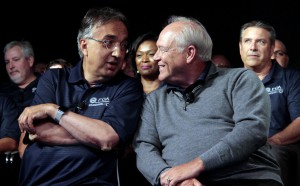With workers ready to take to the street, Fiat Chrysler managed to hammer out a second tentative contract settlement with the United Auto Workers Union just minutes before the midnight deadline on Wednesday.
Negotiators from both sides faced pressure to come up with a better deal than the one originally delivered last month but then rejected by a nearly two-to-one margin in a vote by FCA’s 40,000 U.S. hourly workers. Neither side was willing to discuss details of the new agreement ahead of a Friday morning meeting of UAW leaders.
“FCA US confirms that it has reached a new tentative agreement with the UAW,” read a statement issued by the automaker minutes after the 11:59 pm deadline. “Because the agreement is subject to UAW member ratification, the Company cannot discuss the specifics of the agreement pending a vote by UAW members.”
The union set out to negotiate separate four-year contracts with each of the Detroit Big Three carmakers in July. Following its traditional practice, its negotiators zeroed in on one manufacturer – in this case FCA – seen as most likely to deliver the sort of deal that would set an industry-wide pattern. But negotiations proved more difficult than expected, the original settlement requiring the UAW to briefly extend the September 14th deadline.
And once it did announce a tentative agreement, it quickly started to draw criticism over a variety of issues, including:
- The continuation of a hated two-tier wage structure;
- Changes to the FCA health car program;
- FCA’s plan to move some production to Mexico; and
- A grinding work schedule that allowed FCA to frequently shift workers from day to night shifts and back again.
As a result, the first deal went down in flames, workers voting it down by a 65-35 percent margin.
(For more on why the original FCA-UAW contract was rejected, Click Here.)
How many of those issues have been resolved in the new contract proposal remains to be seen, but going into the second round of talks, UAW President Dennis Williams warned the rank-and-file it would be tough to gain much new ground.
This marked Williams’ first set of negotiations as UAW chief, and he initially sounded a note of optimism that the union could avoid a strike, something he said would come as a “failure,” but he also stressed that he would not shy away from a confrontation, if needed. At this point, despite the potential threat, he appears to have been able to avoid sending workers out onto picket lines.
A strike could have been costly to both sides, analyst Sean McAlinden, of Ann Arbor, Michigan’s Center for Automotive Research, warning it could cost the maker $1 billion in lost revenues a week. Workers, in the meantime, would have lost their own pay and benefits.
And a confrontation might have made it more difficult for the UAW to organize employees at the foreign-owned “transplant” assembly lines dotting the South. That has been a long-term struggle and a key goal for Williams who recently celebrated the decision by Volkswagen to recognize the UAW at its factory in Chattanooga, Tennessee.
At Friday’s meeting, local union leaders from Fiat Chrysler plants across the country will be asked to approve the new contract. It will then go to the rank-and-file for another vote. If the second settlement proves more acceptable, the UAW will resume negotiations with Ford and General Motors with a goal of using the FCA contract as an industry-wide pattern.
(UAW seemed likely to target profitable Jeep plants first. Click Here for more.)

